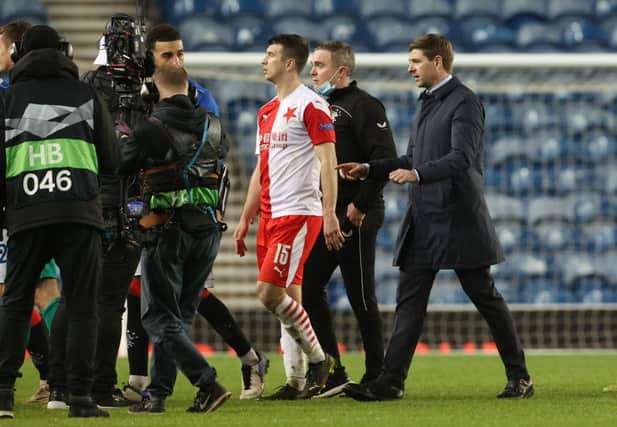World Cup winner reveals grim reason Ondrej Kudela's ban for racially abusing Rangers' Glen Kamara was 'strong' response


For more than a decade the French footballing great has tirelessly fought against it. While many in Scotland felt the ten-game ban handed to Ondrej Kudela for racially abusing Glen Kamara in Rangers’ Europa League last 16-tie against Slavia Prague at Ibrox on March 18 was woefully inadequate, Thuram doesn’t necessarily share that view. However, only because the 49-year-old has such low expectations of the governing body.
“It is a good thing UEFA took what I believe was fairly strong action in the Slavia Prague case. I say that because they have such a bad track record in this area,” said Thuram on a suspension that forced the Czech defender to miss the Euros. “They try to play down racism because it gives the game a bad image; they try to pretend it isn’t there. Everything is done by UEFA and football authorities generally to play these cases down as rogue incidents, to sweep them under the carpet. It is all about protecting the economics of football because advertisers and so on don’t want to be associated with a racist sport.
Advertisement
Hide AdAdvertisement
Hide Ad“For me, it is a moral argument that you come out of it aggrandi – in French that means morally stronger. You must show that by standing up to racism. Too often UEFA and others are looking at the economic arguments, thinking to themselves ‘if we make a big deal, we create a scandal and that gives a bad image to the sport’. There was an incident with a player at Valencia, Mouctar Diakhaby, who was racially abused by an opponent in a game in April. The Valencia players walked off, but they were convinced to come back on the pitch.
"In those instances, when players bring it to the attention of the referee that a player has been abused, or the crowd is making monkey chants, whistling black players, or whatever, typically a white referee will say they didn’t hear anything. And if the player who has been abused ends up getting angry, he will be the one that ends up getting the yellow or red card. It is like with the whistling of players for taking the knee. It ends up with those confronting racism too often being painted as the guilty parties.”
A message from the Editor:
Thank you for reading this article. We're more reliant on your support than ever as the shift in consumer habits brought about by coronavirus impacts our advertisers. If you haven't already, please consider supporting our trusted, fact-checked journalism by taking out a digital subscription.
Comments
Want to join the conversation? Please or to comment on this article.